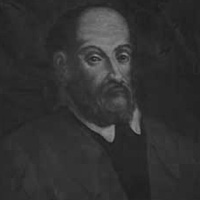From The Poetics of Aristotle Translated and Explained
Castelvetro's work on the Poetics of Aristotle was published in 1570, though often erroneous in transmitting Aristotle's ideas, it was extremely influential in the history of drama and of criticism. Castelvetro emphasized Realism in drama, clarified the distinction between rhetoric and poetry, and defended poetry as a means of pleasure alone as opposed to the earlier opinion that poetry should instruct as well as delight.

Lodovico Castelvetro (1505-1571)
Another critical notion that Castelvetro took issue with was the Platonic concept that poets are possessed with a divine sort of madness. Castelvetro asserted that this was a myth perpetuated by the ignorant masses and by poets themselves.
He is a commentator on Aristotle's Poetics. Castelvetro talks about the three unities, and explains some of the passages of Aristotle to formulate his ideas about it. Poetry is foregrounded - science and arts, and history are not the subject matter of poetry. Poetry has its own qualities. History can be divided in two parts - subject matter and language, and poetry has the same but they differ in selecting subject matter and using language. They are not identical. History deals with real with reasoning but the subject matter in poetry is imagined by the power of poet's mind by using the verse.
The objective of poetry differs from history. In chapter four, he discusses the differences between Aristotle and Plato on the concept of poetry. There is also a discussion of imitation.
The sixth chapter starts with the Platonic concept of poetry that it lowers the people and makes them heartless, coward etc. According to Plato, it does not help us, instead makes us coward and degenerated. But Aristotle talks about pity and fear. When a good character commits a mistake, and suffers, we feel pity on him/her. He uses the word 'catharsis'. It is based on hubris (ego), and flaw (Hamartia).
In 8th chapter, he talks about the concept of unities. Toward the last, he draws the differences between epic and tragedy. He says that they differ in the concept of unities. In 9th chapter, he talks about Michael Angelo that the story of epic/tragedy is related to the principal character. In 13th chapter, he discusses Plato's concepts of pragmatic effect of art. But Aristotle defines it differently: it helps to know the good and bad aspects, and can purify our emotions. In 14th chapter, he discusses the purgation. In 18th chapter, he discuses the role of artist. Not a common man can be a 'poet' (He uses poet for dramatist, and so was done by Aristotle). The last chapter again surmounts over the concepts of unities. His point is to support Aristotelian ideas on dramas.
